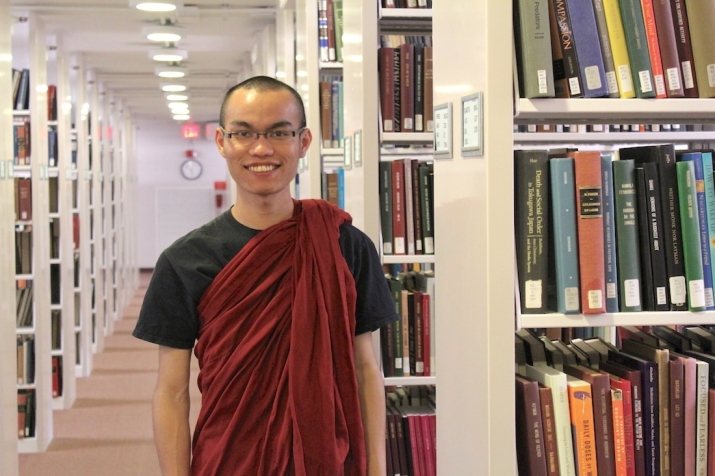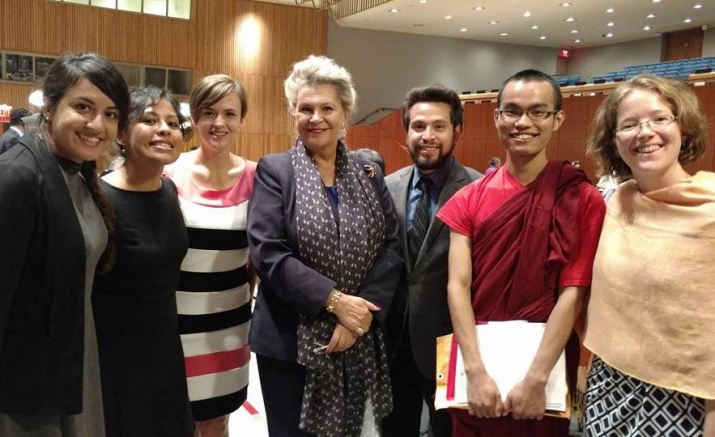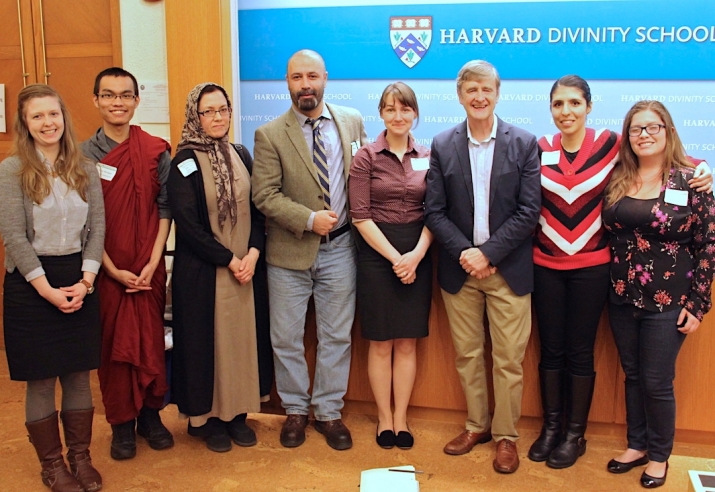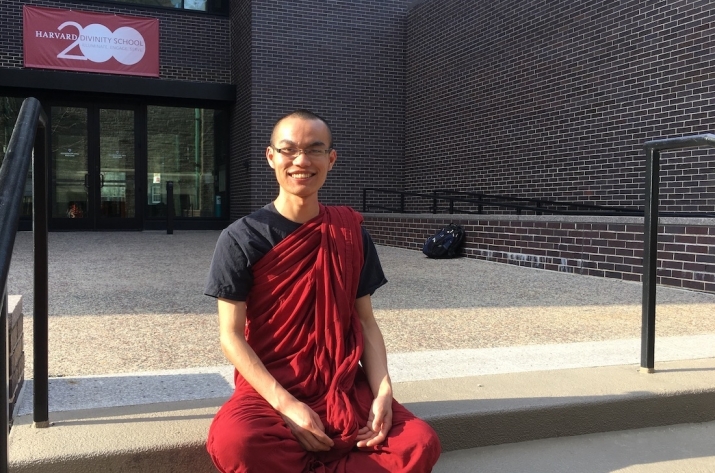FEATURES|COLUMNS|Buddhism in America (inactive)
A Path to Peace: The Engaged Buddhism of Venerable Tajay Bongsa
 Ven. Tajay Bongsa in the HDS library. Photo by Ven. Priyarakkhit Sraman
Ven. Tajay Bongsa in the HDS library. Photo by Ven. Priyarakkhit SramanDuring the Education and Buddhist Ministry Conference at Harvard Divinity School (HDS) in April 2015, Professor Charles Hallisey, Yehan Numata Senior Lecturer on Buddhist Literatures, offered a reflection on the potentially of institutions. He said: “Institutions allow us to do things that go beyond our own lives; they go into the future. They are ways in which humans band together to give gifts to the future.”
Tufts University’s Fletcher School of Law and Diplomacy, in Medford, Massachusetts, can count among its graduates many diplomats, ambassadors, and other powerful agents of global social change. In fall of 2017, this legendary American institution looks likely be blessed to welcome the first Buddhist monk ever to study for a master’s degree there.
Venerable Tajay Bongsa, originally from the Hill Tracts of Bangladesh, already has a master’s degree in Theological Studies from HDS, where he was a Robert H. N. Ho Family Foundation Scholar. Now Ven. Tajay is poised to begin a second masters in Law and Diplomacy at the Fletcher School of Law and Diplomacy. His motivation is to understand suffering—in particular, not just at the individual level, but how it is related to society as a whole. With an emphasis on a holistic approach, the venerable would like to gain a deeper understanding of how institutions and organizations operate and how they could also work to eliminate suffering.
Educated in Sri Lanka, where he graduated from the University of Colombo with a Bachelor of Arts in Buddhist Studies and minors in Pali and Sociology, the monk is also a longtime peace practitioner, with a special involvement in the Religions and the Practice of Peace Initiative (RPP) at HDS. He also has a strong interest in media practices as a potential instrument for change.
I had the opportunity to sit down with Venerable Tajay over tea to learn more about how he sees his work, and how he is approaching this next educational opportunity.
 Ven. Tajay Bongsa with Harvard delegates at the UN. Image courtesy of Ven. Tajay Bongsa
Ven. Tajay Bongsa with Harvard delegates at the UN. Image courtesy of Ven. Tajay BongsaBuddhistdoor Global: Why did you apply to the Fletcher School of Law and Diplomacy?
Ven. Tajay Bongsa: I applied to the Fletcher School because I wanted to go deeper into studying law, diplomacy, international organizations, and human rights, which will perfectly complement my experiences and training at Harvard. Before I applied, I visited the school and attended a few classes with a friend who is doing a joint degree between Fletcher and HDS. I really liked the professors and I knew it was the right place to be, given also Fletcher’s interdisciplinary curriculum and the very supportive community.
BDG: What do you hope to accomplish there?
VTB: I hope to continue engaging in areas such as peace practice and socio-economic development. Besides studying the topics that I applied to study, I’m hoping to help add nuance to discussions of the many roles of religion in international affairs. I’ve been researching the intersection of social and economic development. I hope to continue doing so to find ways to collaborate with faculty from Fletcher and Harvard.
BDG: You were very involved in the RPP at HDS. Can you talk about that initiative and how you participated?
VTB: Dean David N. Hempton of HDS initiated the RPP in 2014 to advance cross-disciplinary engagement, scholarship, and practices, across Harvard and beyond, to explore ways in which we could draw from religious and spiritual traditions to promote sustainable peace.
In my first year at HDS, I was part of the RPP student working group on curriculum development. We met weekly and discussed how we could develop an interdisciplinary curriculum that would draw resources from all over Harvard.
In my second year, I took a class that the RPP was offering for the first time called “Religions and the Practice of Peace: Dean’s Cross-Disciplinary Interfaculty and Graduate Colloquium,” where I had classmates from different Harvard graduate schools. I also worked as a graduate student assistant for the RPP, helping with outreach on RPP and on RPP events and with some administrative work. I also helped research and build, in collaboration with HDS IT and Media Services, an alumni network for the RPP.
It was such a transformative experience for me to be part of the RPP. I had the opportunity to be a facilitator for the “Spiritual Formation and Transformative Leadership” series and to sit on a panel with Prof. Charles Hallisey, Jeffrey R. Seul, and two others on the topic of “Sri Lanka and Myanmar: Religion and Institutions of Civil Society in Conflict and Peacebuilding.”
 Ven. Tajay Bongsa, Dean Hempton, and HDS students. Image courtesy of Maggie Krueger
Ven. Tajay Bongsa, Dean Hempton, and HDS students. Image courtesy of Maggie KruegerBDG: What was your visit to the United Nations like and what did the RPP do there?
VTB: We went to the UN to attend the High-level Forum on the Culture of Peace,* representing the RPP initiative at HDS. We had to submit a report to the RPP the following day about our experiences at the UN, which was published on the RPP website.**
It was my first time at the UN, so I was very excited. The event turned out to be very diplomatic—I guess it’s to be expected from a high-level forum. In the morning, delegates from different countries made statements based on their perspective on the culture of peace and how such a culture might be achieved. Many of these statements touched on the fact that we still have raging conflicts around the world and highlighted the need to empower the youth, to promote human rights development, and to make education an integral part of solidarity and peace.
In the afternoon there were panels, one of which was on “The Role of Youth in Advancing the Culture of Peace in the Context of Implementation of the UN Security Council Resolution on Youth, Peace, and Security.” I expected to see young people involved in the conversation, besides the Secretary-General’s Envoy on Youth, Ahmad Alhendawi.
BDG: Can you speak about the group media initiative you are involved with, and the goals and aspirations for that?
VTB: It was a media startup that we formed at the beginning of the fall 2016 semester. We participated in the President’s Innovation Challenge at the Harvard Innovation Lab. We were not among the finalists, but we did learn a lot in the process.
We started with the need we felt to address how the ways in which mainstream news media tend to deliver news reports make people angry and frustrated, and how they create a disconnect between the audience and the story. We wanted to touch on people’s capacity to feel love and compassion and we wanted to create ways that would allow people to act on that. It’s still a work in progress, but with it we hope to build a global media organization and movement that will create and connect local networks around the world. We basically want to return storytelling to the people.
 Ven. Tajay outside his former school at Harvard. Photo by Ven. Priyarakkhit Sraman
Ven. Tajay outside his former school at Harvard. Photo by Ven. Priyarakkhit SramanBDG: Because of things like the Ho Family Foundation Initiative at HDS, some Buddhist monastics from Asia are taking the opportunity to study at North American institutions. What do you think this means, looking ahead?
VTB: Personally, I think it is very significant in this age to have the opportunity to study at North American institutions. Particularly an institution such as HDS, where you’re not only learning and engaging with classmates and faculty on different religious and spiritual traditions but also looking at religions and spiritual traditions in relation to social, economic, political, and historical forces.
I think this is also important because of the current age and the state of the world that we’re in. We need leaders who authentically care about people and about the world and who do what they do from a place of love, compassion, and understanding. We need to be able to think and imagine from different perspectives and be willing to explore the different interconnections to an issue we’re trying to solve. Leaders from religious and spiritual traditions have a critical role to play.
My one big hope is that opportunities created by initiatives like the Ho Family Foundation Initiative at HDS will pave the way to initiate projects and research and start conversations about how Buddhist educational institutions function these days. I feel that Buddhist education institutions have stagnated in the sense that they’re not helping us understand Buddhism well in relation to the social, economic, political, and even historical circumstances of our times. Also, there is the chance to exchange resources and improve conditions both in Asia and the US.
BDG: Ven. Tajay Bongsa, thank you very much for speaking with us.
Ven. Tajay Bongsa is presently seeking to finalize scholarship funding and, if circumstances allow, plans to begin his master’s degree this fall, which will be another step in his commitment to engendering peace and alleviating suffering. This is a celebration for the future of human society and for the future of Buddhism.
* http://www.un.org/pga/70/events/high-level-forum-on-the-culture-of-peace/
** http://rpp.hds.harvard.edu/news/report-rpp-delegation-united-nations-high-level-forum-culture-peace
See more
Tajaying: Becoming Through Being (Official blog of Ven. Tajay Bongsa)














